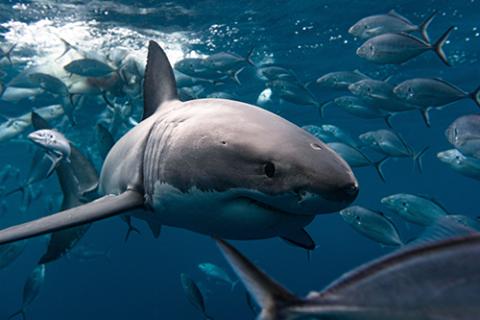A wide cross-section of Australia’s fishing communities came together over the past year at FRDC workshops to address increasing reports of sharks taking fish as they are being caught.
By Brad Collis
Reports of shark depredation on fishing operations have been increasing, to the extent that commercial, charter, and recreational fishers have now reached out for help.
In response, FRDC has held two national workshops over the past year. These workshops aimed to first assess the scale of shark depredation, and then explore mitigation options.
Impacts of depredation
FRDC Senior Research Portfolio Manager, Dr Chris Izzo, says shark depredation is having a detrimental impact on commercial fishers as well as damaging the fishing experience for recreational anglers.

Chris says it also elevates the need to investigate the effect of shark depredation on fish populations, especially species like Spanish Mackerel (Scomberomorini) which appear to be the hardest hit.
“Fortunately, this aspect is already being explored by current FRDC Project (2021-111) looking specifically at shark depredation on Spanish Mackerel.
Shark depredation of fish released after being caught also undermines the effectiveness of catch regulations if, for example, under-size fish are released, only to be taken by waiting sharks.
Current knowledge
At the first workshop in March 2022, Dr Jonathan Mitchell from the Queensland Department of Agriculture and Fisheries, presented a discussion paper on current knowledge.
Dr Mitchell’s paper says depredation rates in commercial fisheries were estimated to range between two and twenty percent. The use of surveillance cameras and genetic tests has identified up to twelve shark species as being responsible.
The paper also found that shark depredation has been reported since the 1800s. Anecdotally it is believed to be increasing but there is little to no empirical data to confirm this.
The online workshops – which attracted a large and diverse cross-section of Australia’s fishing sectors, including fisheries agencies and researchers – revealed a more complex situation.
Mitigation tactics
Dr Chris Izzo said the workshops highlighted the range of efforts fishers had tried to mitigate the problems, for example, modifying fishing gear.
“Mitigation efforts might include simple behaviours such as moving to a new area as sharks arrive – an easy and practical suggestion but with equally practical constraints,” says Chris.
“The workshops were a good opportunity for people from across sectors and jurisdictions to gain a much better idea of the issue as a whole and put their own experiences into context. There is unlikely to be any one solution that will totally address this issue.”
“Commercial fishers were quick to point out they can’t simply abandon a productive area as it goes against the basis of their livelihoods, are the sharks are likely to follow them anyway. They also point out the prohibitive cost of fuel in moving about just to try and avoid sharks.
One unexpected outcome from the workshops was the emergence of a clear dividing line between northern and southern waters. Southern fishers and fisheries managers reported shark depredation was not considered as serious an issue, but they took the opportunity at the workshop to raise similar depredation issues caused by seals in some fisheries.
Next steps
Informed by the outcomes of the workshop series, FRDC will fund further research to better capture the range of mitigation practises or technologies that have been used in Australia, or in other parts of the world, to assess their likely effectiveness.
“It was clear from the workshops there are a lot of ideas out there. What’s needed now is to build an understanding of what might work, do some validation work around that, and then give Australia’s fishing sectors the information to make investment decisions in this space.”
Dr Mitchell’s discussion paper reiterates shark depredation is more complex than it might first appear, and that successful mitigation will involve a mix of behavioural change, technical solutions, and education, with these three components being strongly interlinked. It highlights the complete elimination of shark depredation is unlikely, and expectations for mitigation should be tempered accordingly.
Successful mitigation will also require a comprehensive and collaborative effort between stakeholders, researchers, and fishery managers to increase understanding of the issue and develop effective tools.
Related project
2021-038: Shark depredation in Australian fisheries: understanding the scope of the issue and identify potential mitigation options
This relates to R&D Plan Outcomes 2 and 3





